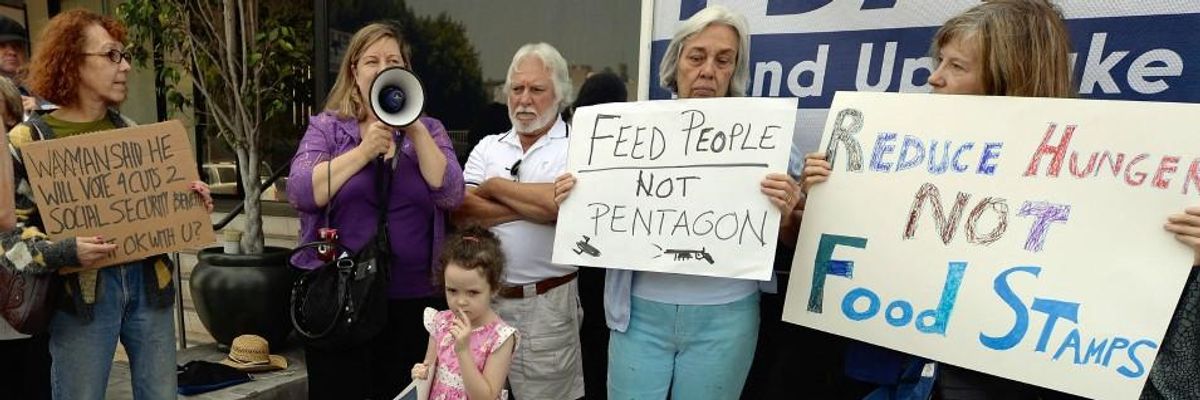Approximately 700,000 people are expected to lose food stamps due to the Trump Administration's new rule on time limits and a related work requirement--a rule that will be especially difficult for those lacking transportation, low-wage workers with unpredictable schedules, people living in rural areas, veterans, former foster youth, people reentering the community after prison, and those with no education past high school. In short, some of the people most vulnerable to hunger in our nation, with an average income that is just 18 percent of the poverty line, or about $2350 annually.
And even more damage to our nation's most successful anti-hunger program is on the horizon.
It raises an age-old question: can anyone--the Democratic party, progressive or union organizers, community-based organizations, a revitalized Poor People's Campaign--build multiracial coalitions to overcome the practice of people voting against their own economic interests based on racial animus that is constantly stoked?
Two other rules that are teed up include changing the utility deductions used when calculating a family's net income and benefit levels. It would especially hit northern states in the winter months. Another rule would bar households with more than $2500 in assets--or $3,500 for a household with a disabled adult--from qualifying for food assistance, and undermine states that want to help families with annual incomes greater than 130% of the poverty line, or more than about $26,000 for a family of three. Taken together, the Urban Institute estimates that had all of these proposed changes been in effect in 2018, 3.7 million fewer people would have received food stamps that year and annual benefits would have fallen by $4.2 billion. (Nearly a million students would have also lost their eligibility for free or reduced price school meals.)
The language the Trump Administration used around the release of the newest attack on assistance is akin to a tutorial on how to demonize people who are struggling. "Government dependency has never been the American dream," said Agriculture Secretary Sonny Perdue in a press release. And in a column for the USA Today, he writes of the need to "move people toward self-sufficiency." If he had pointed out that the average SNAP recipient receives about $4.17 per day the public might realize how ludicrous the idea of a dependency problem is.
The Trump administration's framing is also consistent with a strategy conservatives have used to divide the white and black working class since even before Ronald Reagan's assault on the safety net. As Darrick Hamilton, fellow at the Roosevelt Institute and executive director of The Kirwan Institute for the Study of Race and Ethnicity put it, conservatives portrayed those who benefit from public spending as black and brown people who were "lazy, unvirtuous and undeserving welfare queens." Indeed Lee Atwater, advisor to Presidents Ronald Reagan and George H.W. Bush, described this tactic as a way to get the white vote. Republicans could no longer use the n-word, Atwater said: "That hurts you--backfires." Instead, they would create a caricature of people of color abusing assistance, and talk about cracking down on so-called fraud. They would employ "much more abstract" language, Atwater said--often called "dog-whistles"--to communicate that voting for them means "blacks get hurt worse than whites." That racialized myth is now so ingrained in white America's conscience that when Sec. Perdue writes that the new rule will "restore the dignity of work to a sizeable segment of our population" and "do right by taxpayers," many people--and particularly the Republican base--wrongly perceive "leaders" who are "getting tough" with "freeloading" people of color.
Of course, the assumptions people make about who is in poverty--and who is impacted by cuts to antipoverty programs--have literally nothing to do with reality. In fact, there are 17 million white people in poverty, 9 million African American people, and 10.8 million Hispanic people. And, according to the Urban Institute, the loss of food assistance eligibility due to the new work requirement rule "differs little among racial groups." But the households most impacted by the other rule changes waiting in the wings? Non-Hispanic white and Asian--13 percent of each would have lost food stamp eligibility had the rules been in effect in 2018, compared to 8 percent of African American and 9.5 percent of Hispanic households; and 14 percent of African American and Hispanic participants would have received lower benefits, compared to 17 percent of non-Hispanic white households and 22 percent of Asian households.
It raises an age-old question: can anyone--the Democratic party, progressive or union organizers, community-based organizations, a revitalized Poor People's Campaign--build multiracial coalitions to overcome the practice of people voting against their own economic interests based on racial animus that is constantly stoked? Rev. William Barber II, co-chair of the Poor People's Campaign, raised the issue in a recent interview: "What happens if a movement is able to help people see how they're being played against each other?" he asked. "You could reset the entire political calculus."
The Trump administration was unmoved by the approximately 140,000 comments it received in opposition to the rule changes--comments from bipartisan mayors, governors, pediatricians, and other interested parties. As with so much else during Trump's reign, the efficacy of the normal political process is gone. It begs the question: what will we each do now to stand up for the right of a nation to be free from hunger?




